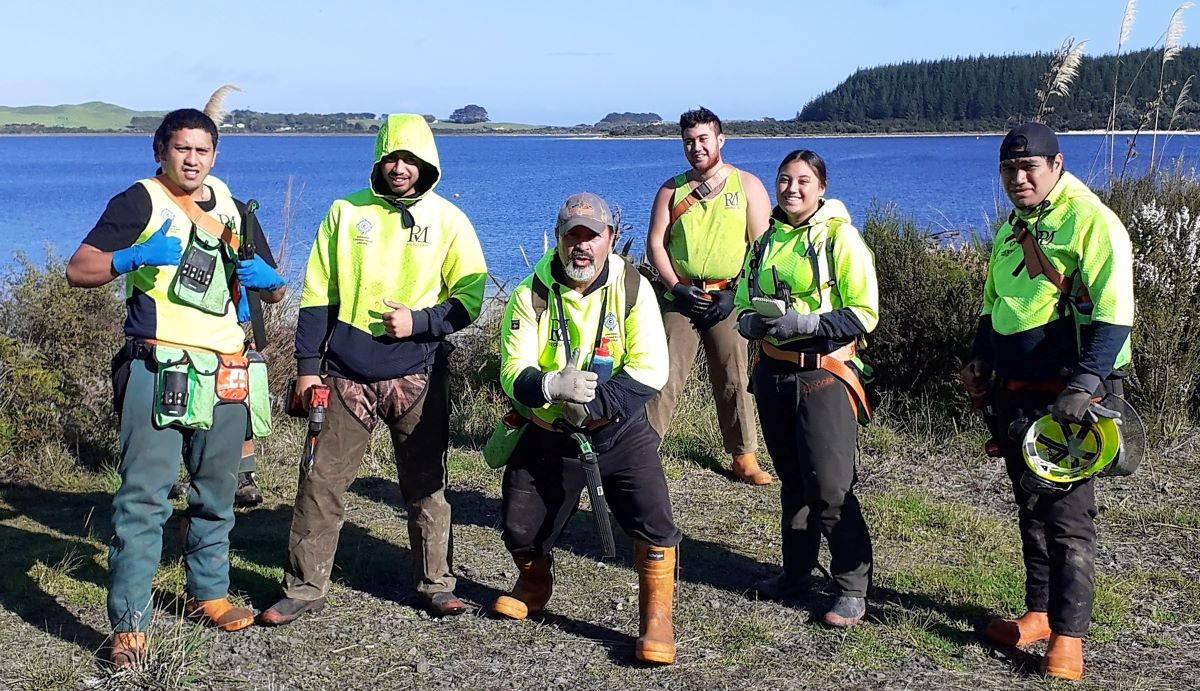Wilding-pine project creates career opportunities for at-risk youth
15 Jun 2020, 7:40 AM
A project to protect Northland’s rare dune lakes from destructive wilding pines is also providing career opportunities for at-risk youth.
Wilding pines are a major problem for Taharoa Domain (Kai Iwi Lakes), a treasured recreation spot for generations of kiwis.
The trees dominate the light, water and food needed by native forest and animals. They also threaten mahinga kai (food-gathering sites) and wāhi tapu (sacred places).
The Northland Regional Council, local iwi, Kaipara District Council, the Department of Conservation and other organisations are working together on the project, along with Northland company RecruitMe NZ.
Since the Covid-19 response Level 2 arrived in late May, six rangatahi (young people) have travelled from Kaikohe to work full-time clearing 50 hectares of the pest trees.
First, the rangatahi completed RecruitMe NZ’s 16-week training programme, in which they learned everything from safe handling of machinery and forestry vehicles to chemical use, mapping and tree classification.
The programme also covered budgeting, goal setting, and some of the challenging issues faced by many Northlanders.
RecruitMe NZ aims to enhance the mana of at-risk youth through bringing them into work.
Operations support worker Matiu Tane says the company provides a pathway to a profession in forestry contracting and operations, for keen young people who are willing to ‘live clean’ of alcohol and drugs.
“All I see in my people is tremendous potential. We want to offer solutions and hope to our people rather than going on about what’s wrong,” he adds.
“Work brings some consistency and structure, structure brings good habits, habits bring a type of mana to them. They’re earning money, they’re organised, they can go off to work and tell their whānau and peers that they’re part of this project.”
Lake Taharoa is one of the world’s largest and deepest dune lakes. Along with Lake Kai Iwi and Lake Waikare, it is home to critically endangered native plants, as well as rare fish such as the dune-lake dwarf inanga, dune-lake galaxias, and longfin and shortfin eels.
Northland Regional Council (NRC) chair Penny Smart says wilding pines are the “right tree in the wrong place” – they don’t belong in Northland habitats such as wetlands, gumlands, or among coastal pōhutukawa, even though many Kiwis have become accustomed to seeing them there.
“They’re causing damage in smaller areas than we see in the South Island, but it’s still hugely significant. These pines are also a big infrastructure problem when they colonise our roadsides and will cost more to deal with later if they’re left to multiply.”
Taharoa Domain is Northland’s pilot site for the National Wilding Conifer Control Programme. The project attracted further investment last month (May) through the government’s $1 million fund to assist Northland forestry workers affected by Covid-19 job losses.
Tane says they are currently training two other forestry crews, and more intakes are planned.
“There’s tremendous opportunity in biodiversity conservation. We want our people to ultimately be business owners, to be in a position where they can positively contribute to New Zealand, their whānau and hapū.”
There’s no shortage of work to be done, by RecruitMe NZ and others, when more funding becomes available, Chair Smart says.
The NRC already has programmes planned to tackle wilding pines on roadsides, around wetlands and in other vulnerable habitats.
“Northland businesses are ready for this, and we can produce an effective result for areas that are really at risk from wilding pines in a short time,” she says.
Councillors say in contrast to the South Island, which is looking at years and years of work, Northland can potentially get rid of its wilding pines over the next several years, and importantly, sustain those gains, because reinvasion and the cost of control beyond five years will be very low.

Tackling wilding pines at Kai Iwi Lakes are, from left, Pita Moana-Hati (20), Benjamin Komene (19), operations support worker Matiu Tane, Matiu Pou (19), Dayna Reihana Ruka (19) and forestry worker Francis ‘Frano’ Peri.
